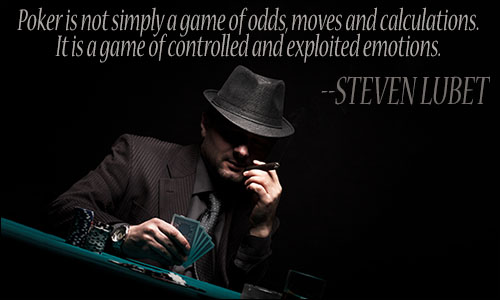POKER QUOTES III
quotations about poker

Notice: Undefined variable: id in /hermes/walnacweb03/walnacweb03ak/b2149/pow.notablequote/htdocs/p/includes/quoter_subj.php on line 27
Poker is that struggle of human versus human, regardless of gender, religion, political affiliation, or economic status. Once the chips are in and the cards are dealt, who wins and who loses has less to do with the cards as the weapons, and more with the players as the crusaders wielding them.
VICTOR H. ROYER
Notice: Undefined variable: id in /hermes/walnacweb03/walnacweb03ak/b2149/pow.notablequote/htdocs/p/includes/quoter_subj.php on line 37
Powerful Profits From Poker
Notice: Undefined variable: id in /hermes/walnacweb03/walnacweb03ak/b2149/pow.notablequote/htdocs/p/includes/quoter_subj.php on line 63
What, then, should you do? With an excellent hand, you should bet: You lose nothing if your opponent folds, while giving yourself a good chance of winning a big pot if he calls. But with a middling hand, you shouldn't bet: If he has a bad hand, he'll fold, and you'll win the ante, which is what you'd have won anyway by checking; but if he has a good hand, he'll call and win. It's heads he wins, tails you don't. You should check instead, and hope your middling hand wins the ante. What about with a terrible hand? Should you check or bet? The answer is surprising. Checking would be unwise, because the hands will be compared and you will lose. It actually makes more sense to bet with these bad hands, because the only way he might drop out is if you make a bet. Perversely, you are better off betting with awful cards than with mediocre ones, the quintessential (and rational) bluff. There's a second reason for you to bet with terrible cards rather than middling ones: Your opponent will have to call a little more often. Because he knows that your bets are sometimes very weak, he can't afford to fold too easily. That means that when you bet with a good hand, you are more likely to be called, and to win when you are. Because you are bluffing with bad cards, your good hands make more money.
TIM HARFORD
The Logic of Life: The Rational Economics of an Irrational World
It's said that the two psychological features of snipers are patience and stubbornness. Some might say the same is true for good poker players.
STEPHEN BLOOMFIELD
"There are life lessons to be learned in poker", Ante Up Magazine, April 25, 2016